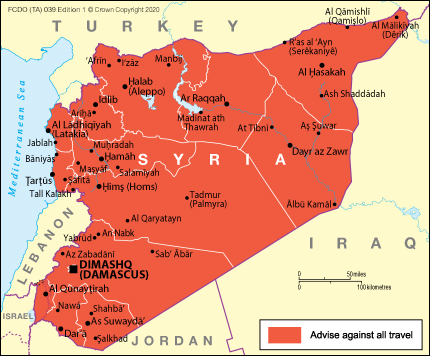Syria
Warnings and insurance

Your travel insurance could be invalidated if you travel against advice from the Foreign, Commonwealth & Development Office (FCDO).
FCDO advises against all travel to Syria
FCDO advises against all travel to Syria due to unpredictable security conditions and the threat of terrorist attacks.
UK government support
Consular support is not available from the British government from within Syria. The FCDO may become aware of support provided by other organisations which can be shared with British nationals. If you need help, call the FCDO in London on +44 (0)20 7008 5000.
Regional escalation
Regional escalation poses significant security risks and has led to travel disruption.
British nationals should:
- read If you’re affected by a crisis abroad - GOV.UK. This includes guidance on “how to prepare for a crisis” with suggestions on what you might include in your emergency supplies and “what to do in a crisis”
- follow advice from the local authorities and sign up to receive information and alerts
- sign up to FCDO Travel Advice email alerts
- monitor local and international media for the latest information
- stay away from areas around security or military facilities
- keep your departure plans under review, and ensure your travel documents are up to date
- if you are advised to take shelter, stay indoors or find the nearest safe building or designated shelter. An interior stairwell or a room with as few external walls or windows as possible may provide additional protection
Travel insurance
If you choose to travel against FCDO advice, research your destinations and get appropriate travel insurance. Insurance should cover your itinerary, planned activities and expenses in an emergency. Have robust security arrangements and contingency plans in place.
About FCDO travel advice
FCDO provides advice about risks of travel to help British nationals make informed decisions. Find out more about FCDO travel advice.
Get travel advice updates
Sign up to get email notifications when this travel advice is updated.
Follow and contact FCDO: